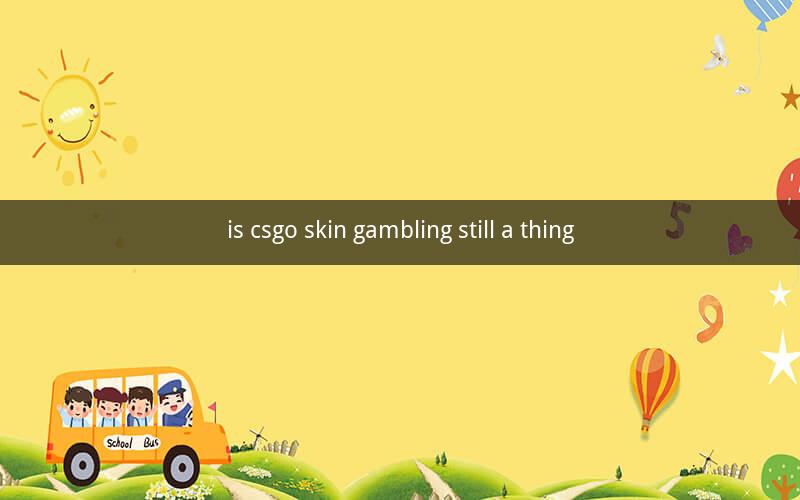
Table of Contents
1. Introduction to CSGO Skin Gambling
2. The Rise and Fall of CSGO Skin Gambling
3. Current Status of CSGO Skin Gambling
4. Legal and Ethical Concerns
5. The Impact on the Gaming Community
6. Efforts to Combat CSGO Skin Gambling
7. Alternatives to CSGO Skin Gambling
8. The Future of CSGO Skin Gambling
9. Conclusion
---
1. Introduction to CSGO Skin Gambling
CSGO (Counter-Strike: Global Offensive) skin gambling has been a topic of debate and controversy within the gaming community. It involves the use of virtual items, known as skins, from the game for betting purposes. These skins are often cosmetic items that can be acquired through gameplay or purchased from other players.
2. The Rise and Fall of CSGO Skin Gambling
The concept of skin gambling gained popularity following the introduction of skins in CSGO in 2013. The allure of potentially winning rare and valuable skins motivated many players to participate in betting. However, this practice quickly became controversial due to concerns about addiction, fraud, and the potential for money laundering.
3. Current Status of CSGO Skin Gambling
Over the years, the popularity of CSGO skin gambling has fluctuated. While it was once a thriving underground market, regulatory actions and platform updates have significantly reduced its prevalence. Steam, the primary platform for CSGO, has implemented strict policies against gambling-related activities, making it more challenging for players to engage in skin betting.
4. Legal and Ethical Concerns
The legality of CSGO skin gambling varies by jurisdiction. In some countries, it is outright illegal, while in others, it is only prohibited on certain platforms. Ethically, the practice raises concerns about the potential for addiction, the exploitation of vulnerable individuals, and the normalization of gambling.
5. The Impact on the Gaming Community
CSGO skin gambling has had a mixed impact on the gaming community. On one hand, it has introduced a new layer of excitement and competition to the game. On the other hand, it has led to numerous instances of fraud, cheating, and exploitation. Many players have been negatively affected by the activities of skin gamblers.
6. Efforts to Combat CSGO Skin Gambling
Efforts to combat CSGO skin gambling have been multifaceted. Game developers, such as Valve, have implemented strict policies and updates to prevent gambling-related activities. Additionally, regulatory bodies and law enforcement agencies have taken action against individuals and platforms facilitating skin gambling.
7. Alternatives to CSGO Skin Gambling
In response to the decline of CSGO skin gambling, alternative methods of skin trading and betting have emerged. These include official betting platforms and skin marketplaces that offer regulated and safer environments for players to engage in these activities.
8. The Future of CSGO Skin Gambling
The future of CSGO skin gambling remains uncertain. While the practice has significantly diminished, it is possible that new methods of skin betting could emerge. It is crucial for the gaming community and regulatory bodies to remain vigilant and take proactive measures to prevent the resurgence of skin gambling.
9. Conclusion
CSGO skin gambling has been a contentious issue within the gaming community. While it has had its heyday, the combination of legal action, platform updates, and ethical concerns has led to its decline. As the gaming industry continues to evolve, it is essential to monitor the impact of skin gambling and take appropriate measures to ensure a safe and enjoyable experience for all players.
---
Questions and Answers
1. Q: What are CSGO skins?
A: CSGO skins are cosmetic items that can be applied to weapons and other items in the game, enhancing their appearance.
2. Q: Why was CSGO skin gambling controversial?
A: CSGO skin gambling was controversial due to concerns about addiction, fraud, and the potential for money laundering.
3. Q: What actions has Steam taken to combat CSGO skin gambling?
A: Steam has implemented strict policies against gambling-related activities, including the suspension of accounts involved in skin betting.
4. Q: How has the legal status of CSGO skin gambling varied by country?
A: The legality of CSGO skin gambling varies by country, with some countries outright banning it and others allowing it on certain platforms.
5. Q: What are some alternative methods of skin trading and betting?
A: Alternative methods include official betting platforms and skin marketplaces that offer regulated and safer environments for players.
6. Q: How has CSGO skin gambling impacted the gaming community?
A: CSGO skin gambling has had a mixed impact, introducing excitement and competition while also leading to fraud and exploitation.
7. Q: What measures can be taken to prevent the resurgence of skin gambling?
A: Proactive measures include continued monitoring, strict enforcement of policies, and education about the risks of skin gambling.
8. Q: How can players protect themselves from falling victim to skin gambling scams?
A: Players can protect themselves by staying informed about the risks, using reputable platforms, and avoiding engaging in unregulated skin betting.
9. Q: What role do regulatory bodies play in combating CSGO skin gambling?
A: Regulatory bodies play a crucial role in enforcing laws and regulations, investigating violations, and providing guidance on the legal status of skin gambling.
10. Q: How can the gaming community contribute to the prevention of skin gambling?
A: The gaming community can contribute by reporting suspicious activities, promoting awareness of the risks, and supporting efforts to combat skin gambling.